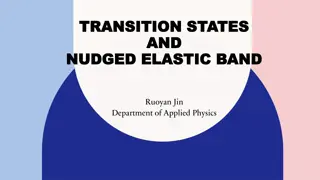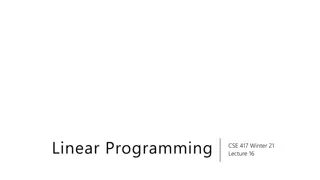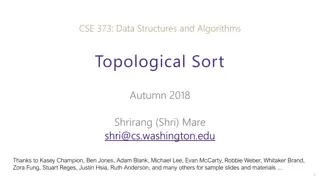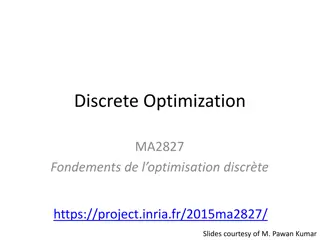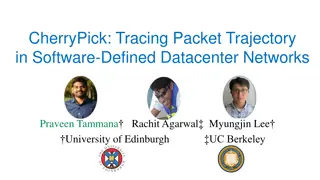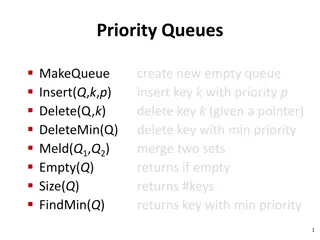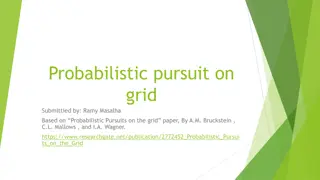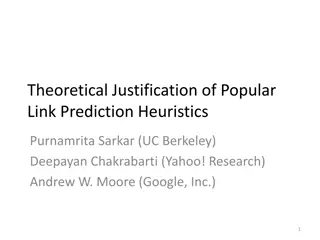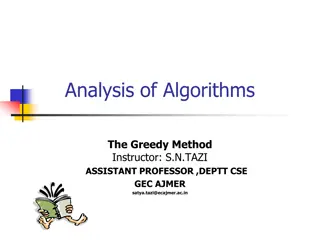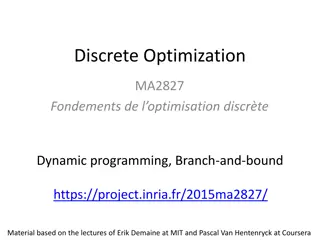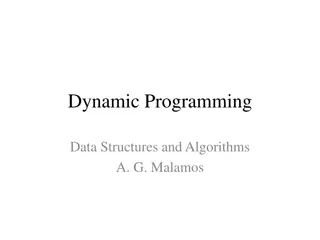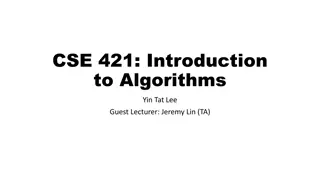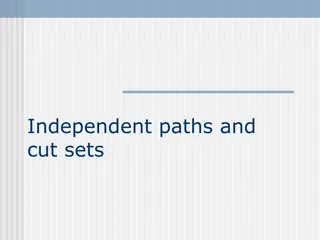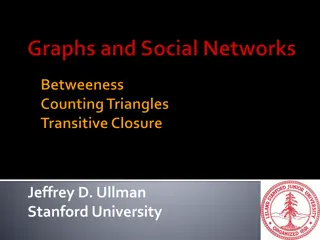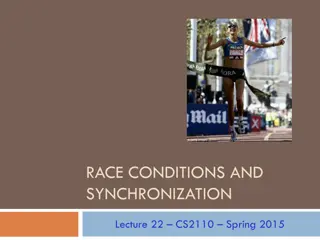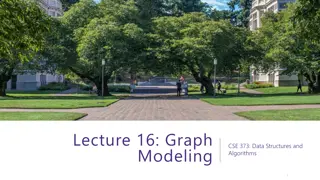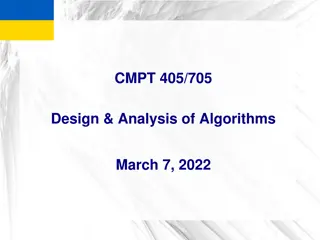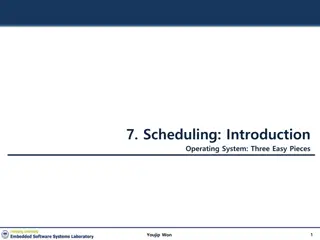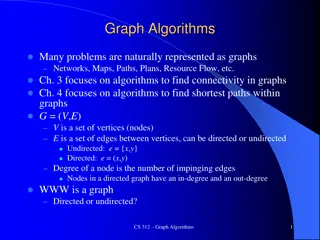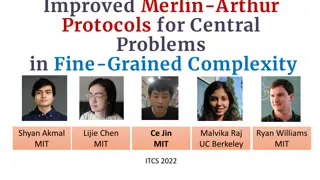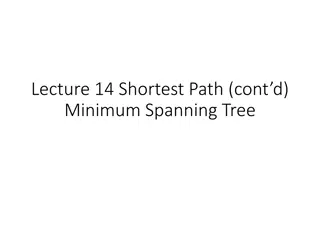Tinkering with Sphero Indi
Dive into a bite-sized Tech Tuesday lesson where you'll learn to tinker with Sphero Indi, a programmable robot. Discover the basics of robotics, directional commands, and sequencing paths. Engage in activities like predicting Indi's movements and creating your own paths. Explore cross-curricular app
0 views • 13 slides
COMPSCI 330: Design and Analysis of Algorithms
Logistics for COMPSCI 330 include lecture and recitation schedules, grading breakdown, exam conflicts, contact information, and lecture format. Dr. Rong Ge emphasizes hands-on learning through proofs and recording lectures. The course covers algorithm basics such as divide and conquer, dynamic progr
1 views • 20 slides
Opportunities and Insights at El Paso Electric: A Summer Externship Experience
Explore the diverse opportunities available at El Paso Electric, ranging from internships to lineworker apprenticeships. Gain valuable insights from employee feedback and advice on career paths post high school. Dive into departments visited and discover potential career paths in the electrical indu
4 views • 11 slides
Charting Career Paths: The Role of Placement Agencies in Montreal
\"Charting Career Paths: The Role of Placement Agencies in Montreal\" delves into how placement agencies in Montreal act as catalysts, connecting job seekers with diverse opportunities while assisting businesses in finding the perfect talent. These agencies streamline the hiring process, offering pe
5 views • 5 slides
Charting Your Course Engineering Career Paths After JMIT, Haryana
JMIT, a prominent engineering college in Haryana, equips you with a strong foundation in engineering principles. But what next? The world of engineering offers a vast array of exciting career paths. This article explores some of the fulfilling possibilities that await you after graduating from JMIT.
0 views • 2 slides
Charting Your Course Engineering Career Paths After JMIT, Haryana
JMIT, a prominent engineering college in Haryana, equips you with a strong foundation in engineering principles. But what next? The world of engineering offers a vast array of exciting career paths. This article explores some of the fulfilling possibilities that await you after graduating from JMIT.
0 views • 2 slides
Understanding Transition States and Nudged Elastic Band in Applied Physics
Description of transition states, potential energy surfaces, saddle points, minimum energy paths, and the Nudged Elastic Band method in the context of applied physics. The content explains key concepts such as transition states along reaction coordinates, the significance of potential energy surface
0 views • 9 slides
Decisions in the Woods: Analysis of Robert Frost's "The Road Not Taken
Exploring Robert Frost's iconic poem "The Road Not Taken" which delves into themes of choices, regrets, and the paths we choose in life. Frost's symbolic use of two roads in a wood captures the essence of decision-making and the consequences that follow. The speaker's contemplation between diverging
1 views • 16 slides
Devotional Paths to the Divine: A Journey Through Bhakti Movements
Explore the rich history of devotional paths to the divine, from rituals of worship to intense love of God through different bhakti and Sufi movements. Discover the evolution of the idea of a Supreme God and the emergence of new forms of bhakti in South India led by Nayanars and Alvars. Delve into t
0 views • 11 slides
Understanding All Pairs Shortest Paths Algorithms in Graph Theory
Learn about various algorithms such as Dijkstra's, Bellman-Ford, and more for finding the shortest paths between all pairs of vertices in a graph. Discover pre-computation benefits and clever recurrence relationships in optimizing path calculations.
0 views • 35 slides
Shortest Paths Algorithms and Applications Overview
This material covers various aspects of shortest path algorithms, focusing on Dijkstra's algorithm with binary heap and its time complexity. It delves into the history of shortest path algorithms, highlighting key authors and their contributions. Additionally, it explores different applications of s
4 views • 27 slides
Constructing Perpendiculars: Shortest Distance to a Point
Learn how to find the shortest distance from a point to a line, ensuring the path taken is efficient and direct. By constructing a perpendicular from the point to the line, you guarantee the shortest possible route, creating a right angle with the line. Explore the process of constructing perpendicu
2 views • 17 slides
Comprehensive Workplace Health & Safety Resources by PATHS in Pennsylvania
PATHS, established by the PA Department of Labor & Industry, Bureau of Workers Compensation, offers statewide cost-effective health and safety resources to employers and employees. The PATHS website provides access to training, resources, safety forms, publications, and more. With over 200 training
0 views • 13 slides
Discrete Optimization: Fundamentals and Applications
Explore the foundations of discrete optimization in MA2827 with a focus on graph theory, complexity basics, shortest path algorithms, minimum spanning trees, maximum flow, and more. Dive into concepts such as Menger's Theorem, disjoint paths, path packing, and directed graphs. Gain insights into ver
0 views • 34 slides
Optimal Pathfinding in the Shortest Race
The problem involves finding the optimal point to touch a fence while racing from tree A to tree B to minimize the distance run. By reflecting point A in the fence line to point A' and joining A' to B, the point where AB crosses the fence line gives the solution. This approach is based on the princi
0 views • 25 slides
Enhancing Network Debugging with CherryPick in Software-Defined Datacenter Networks
Explore CherryPick, a technique for tracing packet trajectory in software-defined datacenter networks. It helps in debugging by ensuring data plane conforms with control plane policies, localizing network problems, and enabling packet trajectory tracing challenges like non-shortest paths. CherryPick
0 views • 14 slides
Priority Queues: Operations and Implementations
Priority queues are data structures that allow efficient insertion, deletion, and retrieval of elements based on their priority. This information-rich content covers various aspects of priority queues, including ideal times, binomial queues, Dijkstra's algorithm for single-source shortest paths, and
0 views • 11 slides
Understanding Centrality Measures in Peer-to-Peer and Social Networks
Centrality measures in networks quantify the importance of nodes based on their influence, accessibility, and role as connectors. Important centrality measures include Degree centrality (based on the number of connections), Closeness centrality (based on short paths to other nodes), and Betweenness
0 views • 27 slides
Probabilistic Pursuit on Grid: Convergence and Shortest Paths Analysis
Probabilistic pursuit on a grid involves agents moving towards a target in a probabilistic manner. The system converges quickly to find the shortest path on the grid from the starting point to the target. The analysis involves proving that agents will follow monotonic paths, leading to efficient con
0 views • 19 slides
Theoretical Justification of Popular Link Prediction Heuristics
This content discusses the theoretical justification of popular link prediction heuristics such as predicting connections between nodes based on common neighbors, shortest paths, and weights assigned to low-degree common neighbors. It also explores link prediction generative models and previous empi
0 views • 39 slides
Overview of Greedy Method in Algorithm Analysis
The Greedy Method in algorithm analysis involves making locally optimal decisions that eventually lead to a globally optimal solution. This method is illustrated through examples such as finding the shortest paths on special and multi-stage graphs, and solving the activity selection problem. While t
0 views • 16 slides
Dynamic Programming in Discrete Optimization: A Powerful Algorithm Design Technique
Dynamic programming is a powerful algorithm design technique that allows solving complex problems efficiently by breaking them down into overlapping subproblems. This approach, as discussed in the material based on the lectures of Erik Demaine at MIT and Pascal Van Hentenryck at Coursera, involves r
0 views • 69 slides
Understanding Dynamic Programming in Algorithms
Dynamic programming and linear programming are powerful techniques that come into play when specialized methods fall short. Dynamic programming involves solving a problem by breaking it down into smaller subproblems and solving them incrementally. In this approach, the nodes represent subproblems, a
0 views • 40 slides
Understanding Spanning Trees and Minimum Spanning Trees
Explore the concept of spanning trees and minimum spanning trees in graph theory through an in-depth lecture outline covering topics like Cut Property, Cycle Property, Kruskal's Algorithm, and more. Delve into the significance of Minimum Spanning Trees (MSTs) as the lowest-cost spanning tree of a gr
1 views • 41 slides
Understanding Independent Paths and Cut Sets in Graph Theory
Independent paths and cut sets play a crucial role in graph theory, determining connectivity and flow rates in networks. Learn about edge-independent paths, vertex-independent paths, connectivity, cut sets, Menger's theorem, and the Max-flow/min-cut theorem, with practical examples and implications.
0 views • 10 slides
Graph Analysis Techniques and Algorithms
Graph analysis involves utilizing different algorithms for parallelizing activities and performing operations like relational joins efficiently in large graphs with small diameters. Techniques such as dividing graphs into communities based on edge betweenness are explored. Breadth-first search is ap
0 views • 58 slides
Divide-and-Conquer Algorithm for Two-Point Shortest Path Queries in Polygonal Domains
In this research presented at SoCG 2019, a new divide-and-conquer algorithm is proposed for efficiently handling two-point shortest path queries in polygonal domains. The algorithm offers significant improvements in preprocessing space and query time compared to previous methods, making it a valuabl
1 views • 19 slides
Unveiling Psalm 117: Exploring the Shortest Chapter in the Bible
Delve into the depths of Psalm 117, the shortest chapter in the Bible, through an extensive sermon that reveals its profound message of praise and mercy towards all nations. Uncover the significance of the Lord's enduring truth and merciful kindness, inviting all peoples to lift their voices in prai
0 views • 21 slides
Understanding Depth-First Search in State Space Exploration
Depth-First Search (DFS) is a search strategy employed in state space exploration, where the search algorithm delves deep into a single branch of the search tree before backtracking to explore alternative paths. DFS is efficient for deep search spaces but can get lost in blind alleys if not implemen
0 views • 19 slides
Efficient Truck Routing Program for Parcel Delivery
Create a program to efficiently route trucks for delivering parcels between cities, optimizing for cost and time constraints. Consider factors like waiting times, travel costs, and parcel payoff. Use shortest paths and implement necessary algorithms for effective truck routing.
0 views • 41 slides
Graph Modeling in Data Structures and Algorithms
Exploring graph modeling in CSE 373, this lecture covers topics such as using BFS for finding shortest paths, limitations of BFS on weighted graphs, and the introduction of Dijkstra's algorithm for weighted graphs. It emphasizes the importance of considering edge weights in determining traversal ord
0 views • 29 slides
Exploring Avatar Path Clustering in Networked Virtual Environments
Explore the concept of Avatar Path Clustering in Networked Virtual Environments where users with similar behaviors lead to comparable avatar paths. This study aims to group similar paths and identify representative paths, essential in analyzing user interactions in virtual worlds. Discover related w
0 views • 31 slides
Dynamic Programming for Finding Paths of Length k in Graphs
Today's plan involves exploring dynamic programming techniques for finding paths of length k in graphs. The focus will be on solving the rainbow-k-path problem and utilizing DP algorithms to achieve efficient solutions. By constructing tables and utilizing key observations, we aim to find simple pat
0 views • 15 slides
Understanding Unit Testing in Software Engineering
Concept Software is a discipline comprising various code pieces. Testing these codes together is complex but vital in Software Engineering. The process includes early testing like unit tests, pairwise/multiple component testing, module testing, integration testing, user tests, alpha tests, beta test
1 views • 6 slides
Scheduling Strategies in Operating Systems
Operating systems utilize various scheduling algorithms to manage the execution of tasks efficiently. This includes strategies like First In, First Out (FIFO), Shortest Job First (SJF), and Shortest Time-to-Completion First (STCF). Each algorithm has its advantages and limitations, impacting factors
0 views • 17 slides
The Fascinating Euler Paths and the Seven Bridges of Konigsberg
Explore the intriguing world of Euler paths through the historical context of the Seven Bridges of Konigsberg. Learn about Leonhard Euler, the concept of Euler paths, and how to determine if a shape has a valid Euler path. Dive into the reasoning behind Euler paths and why they work with shapes of 0
0 views • 9 slides
Understanding Graph Algorithms for Connectivity and Shortest Paths
Graph algorithms play a crucial role in solving problems represented as networks, maps, paths, plans, and resource flow. This content delves into ways to find connectivity in graphs and algorithms for determining shortest paths. It discusses graph representations using adjacency matrices and lists,
1 views • 32 slides
Improved Merlin-Arthur Protocols for Fine-Grained Complexity Problems
The text discusses Merlin-Arthur proof systems and protocols for central problems in fine-grained complexity, particularly focusing on the time complexity, completeness, and soundness of these protocols. It also touches on recent interest in these protocols and presents new results in areas such as
0 views • 16 slides
Understanding Dijkstra's Algorithm for Shortest Paths with Weighted Graphs
Dijkstra's Algorithm, named after inventor Edsger Dijkstra, is a fundamental concept in computer science for finding the shortest path in weighted graphs. By growing a set of nodes with computed shortest distances and efficiently using a priority queue, the algorithm adapts BFS to handle edge weight
0 views • 30 slides
Bellman-Ford Algorithm: Shortest Path with Negative Edge Length
The Bellman-Ford algorithm addresses the challenge of finding the shortest path in graphs with negative edge lengths, particularly useful in scenarios such as arbitrage in currency exchange rates. By utilizing dynamic programming and steps iteration, the algorithm efficiently detects negative cycles
2 views • 16 slides






